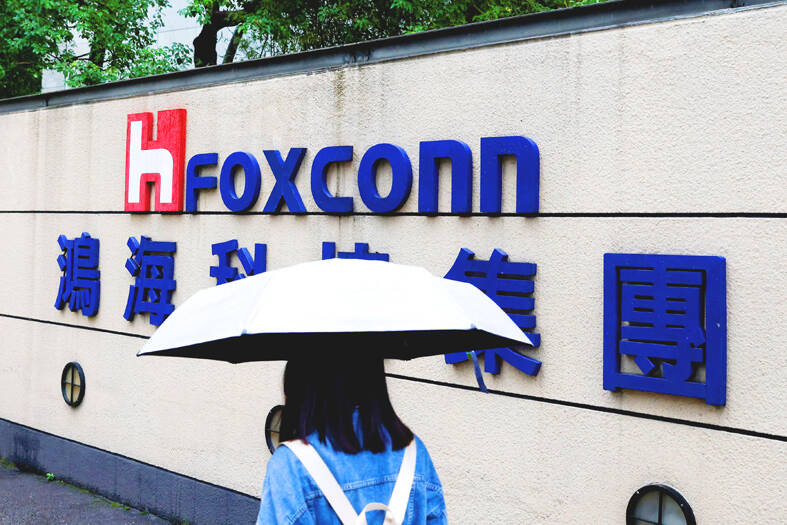Apple Inc partner Foxconn Technology Group (富士康科技集團) plans to invest about US$700 million on a new plant in India to ramp up local production, people familiar with the matter said, underscoring an accelerating shift of manufacturing away from China as Washington-Beijing tensions grow.
The company, known as Hon Hai Precision Industry Co (鴻海精密) in Taiwan, plans to build the plant to make iPhone parts on a 121 hectare site close to the airport in Bengaluru, the capital of the southern Indian state of Karnataka, said the people, who asked not to be named as the information is not public.
The factory might assemble Apple’s handsets, some of the people said, and Foxconn might also use the site to produce some parts for its nascent electric vehicle business.

Photo: Carlos Garcia Rawlins, Reuters
The investment is one of Foxconn’s biggest single outlays to date in India and underscores how China is at risk of losing its status as the world’s largest producer of consumer electronics.
Apple and other US brands are leaning on their China-based suppliers to explore alternative locations such as India and Vietnam. It is a rethink of the global supply chain that accelerated during the COVID-19 pandemic and the war in Ukraine, and could reshape the way global electronics are made.
The new production site in India is expected to create about 100,000 jobs, the people said.
The company’s iPhone assembly complex in Zhengzhou, China, employs about 200,000 people at the moment, although that number surges during peak production season.
Output at the plant in Henan Province plunged ahead of the year-end holidays due to pandemic-related disruptions, spurring Apple to re-examine its China-reliant supply chain.
Foxconn’s decision is the latest move that suggests suppliers might move capacity out of China far faster than expected.
The plans could still change, as Foxconn is in the process of finalizing investment and project details, the people said.
It was also unclear whether the plant represents new capacity or production that Foxconn is shifting from other sites such as its Chinese facilities.
Apple declined to comment.
Hon Hai, whose chairman, Young Liu (劉揚偉), met with Indian Prime Minister Narendra Modi this week, did not immediately respond to an e-mail seeking comment.
The Karnataka state government also did not immediately respond.
Liu, who is on tour in India, has committed to another manufacturing project in Telangana state.
Foxconn’s decision would be a coup for Modi’s government, which sees an opportunity to close India’s technology gap with China as Western investors and corporations sour on Beijing’s crackdowns on the private sector.
India has offered financial incentives to Apple suppliers such as Foxconn, which began making the latest generation of iPhones at a site in Tamil Nadu last year.
Smaller rivals Wistron Corp (緯創) and Pegatron Corp (和碩) have also ramped up operations in India, while suppliers such as Jabil Inc have begun making components for AirPods there.

MULTIFACETED: A task force has analyzed possible scenarios and created responses to assist domestic industries in dealing with US tariffs, the economics minister said The Executive Yuan is tomorrow to announce countermeasures to US President Donald Trump’s planned reciprocal tariffs, although the details of the plan would not be made public until Monday next week, Minister of Economic Affairs J.W. Kuo (郭智輝) said yesterday. The Cabinet established an economic and trade task force in November last year to deal with US trade and tariff related issues, Kuo told reporters outside the legislature in Taipei. The task force has been analyzing and evaluating all kinds of scenarios to identify suitable responses and determine how best to assist domestic industries in managing the effects of Trump’s tariffs, he

TIGHT-LIPPED: UMC said it had no merger plans at the moment, after Nikkei Asia reported that the firm and GlobalFoundries were considering restarting merger talks United Microelectronics Corp (UMC, 聯電), the world’s No. 4 contract chipmaker, yesterday launched a new US$5 billion 12-inch chip factory in Singapore as part of its latest effort to diversify its manufacturing footprint amid growing geopolitical risks. The new factory, adjacent to UMC’s existing Singapore fab in the Pasir Res Wafer Fab Park, is scheduled to enter volume production next year, utilizing mature 22-nanometer and 28-nanometer process technologies, UMC said in a statement. The company plans to invest US$5 billion during the first phase of the new fab, which would have an installed capacity of 30,000 12-inch wafers per month, it said. The

Taiwan’s official purchasing managers’ index (PMI) last month rose 0.2 percentage points to 54.2, in a second consecutive month of expansion, thanks to front-loading demand intended to avoid potential US tariff hikes, the Chung-Hua Institution for Economic Research (CIER, 中華經濟研究院) said yesterday. While short-term demand appeared robust, uncertainties rose due to US President Donald Trump’s unpredictable trade policy, CIER president Lien Hsien-ming (連賢明) told a news conference in Taipei. Taiwan’s economy this year would be characterized by high-level fluctuations and the volatility would be wilder than most expect, Lien said Demand for electronics, particularly semiconductors, continues to benefit from US technology giants’ effort

‘SWASTICAR’: Tesla CEO Elon Musk’s close association with Donald Trump has prompted opponents to brand him a ‘Nazi’ and resulted in a dramatic drop in sales Demonstrators descended on Tesla Inc dealerships across the US, and in Europe and Canada on Saturday to protest company chief Elon Musk, who has amassed extraordinary power as a top adviser to US President Donald Trump. Waving signs with messages such as “Musk is stealing our money” and “Reclaim our country,” the protests largely took place peacefully following fiery episodes of vandalism on Tesla vehicles, dealerships and other facilities in recent weeks that US officials have denounced as terrorism. Hundreds rallied on Saturday outside the Tesla dealership in Manhattan. Some blasted Musk, the world’s richest man, while others demanded the shuttering of his